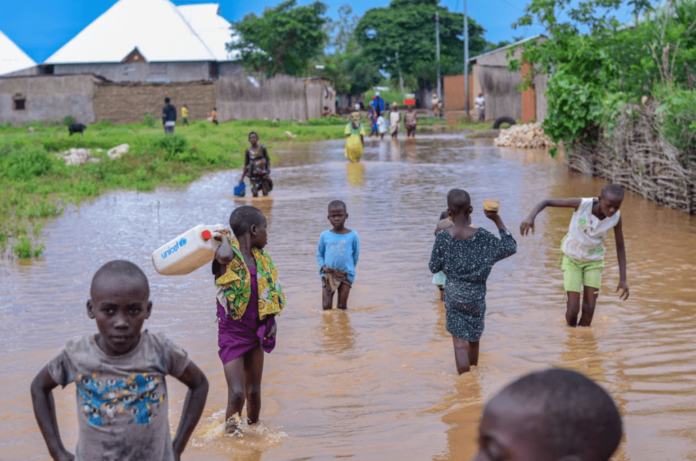
Large numbers of people in Kenya, Burundi, Tanzania and Somalia were displaced and significant damage was reported to homes, schools and infrastructure, as well as the loss of crops and livestock. Many families have been forced to leave their homes, seeking refuge in makeshift structures or evacuation centres. These are the people who are already the most vulnerable, often living in informal settlements, near riverbanks and without reliable water and sanitation. The situation has further aggravated the lives of women and children, who already face high levels of discrimination in access to protection services and resources, as well as vulnerability to violence, abuse and exploitation.
In Kenya, schools have been closed for several weeks and are expected to reopen next week. The floods caused another outbreak of cholera, with 48 cases reported. In Somalia, over 160,000 people have been affected by the latest floods, two-thirds of them children.
“The heavy rains and subsequent flooding have turned lives upside down, posing significant risks for children in the affected regions. At present, safety and health, as well as access to food, clean water and vital services, remain paramount. UNICEF is working closely with governments and local partners in affected communities to identify the most urgent needs and ensure that children are safe, can continue their education and receive the psychosocial support they need,” said UNICEF Regional Director for Eastern and Southern Africa Etleva Kadilli.
In flood-affected countries, UNICEF is working with government and civil society partners to provide life-saving emergency aid to children and other vulnerable groups in affected communities. Interventions include cash assistance, technical support and the provision of clean water, hygiene kits and medical supplies. UNICEF is also working with partners to identify needs that will emerge once the dust settles. These include:
- Ensuring continuity of safe learning where schools are destroyed, closed or inaccessible; supporting rapid school assessments, recovery and reconstruction efforts to return children to school as soon as possible. In addition, UNICEF will work with partners to promote accelerated learning and recovery to help children catch up.
- Protect children from forced separation from their families, increased exposure to violence, including sexual violence, and keep them safe from exploitative activities such as child labour and abuse.
- Ensure access to safe water and sanitation services, improve infection prevention and control measures against outbreaks of infectious diseases, and strengthen the capacity of community health workers.
- Improve access to life-saving, high-impact, quality health services that improve the health status of affected communities.
- Establish and strengthen access to essential nutrition services, including support to governments to ensure the provision of and access to quality diets, practices and services.
- Strengthen risk communication and community engagement (RCCE) with governments and local partners in areas affected by El Niño.
- Ensure availability of services for survivors of gender-based violence (GBV), including referrals, case management, psychosocial support and ongoing efforts to identify and reduce GBV risks in affected communities.
Over the past decade, climate change has intensified extreme weather conditions in eastern and southern Africa, such as the prolonged drought in Kenya, Ethiopia and Somalia from 2020 to 2023, followed by severe flooding since the end of last year. In East Africa, El Niño-induced heavy rains have intensified river and flash floods. In southern Africa, El Niño worsened drought conditions and caused a decrease in rainfall, leading to the declaration of a state of emergency in Madagascar, Malawi, Zambia and Zimbabwe.
To help children and vulnerable communities cope with climate change, UNICEF is working with regional and national partners to facilitate and implement climate resilient solutions, empower children and youth, including those with disabilities, to have their voices heard and improve their adaptive capacity, and advocate for the reduction of greenhouse gas emissions worldwide, the use of nature-based solutions, and the revision of international climate finance to be child-friendly.
“As the drought and flooding crises caused by El Niño worsen, the vulnerability of communities across eastern and southern Africa intensifies, posing serious concerns about the future of children in the region,” Kadilli said. “Children, youth and women, including those with disabilities, are particularly at risk of violence, abuse and exploitation, while humanitarian needs continue to increase. Thanks to the valuable support of our donors and partners, UNICEF is actively engaged in the field. Together with governments, civil society and local communities, we are providing life-saving interventions and preparing for potential increases in humanitarian needs. However, the cost, scale and complexity of climate crises are set to increase across the region. Continued and flexible support from donors and multilateral climate funds, including joint investments and other innovative financing with governments in climate prevention and preparedness programmes, will be critical to save lives and strengthen the resilience of children repeatedly affected by climate emergencies.”



































